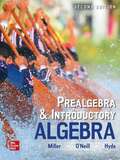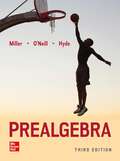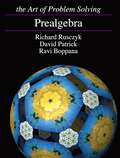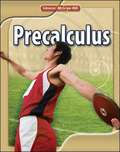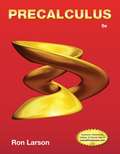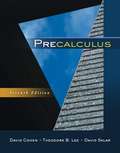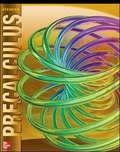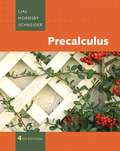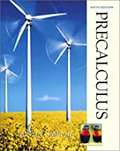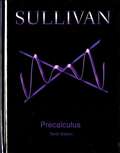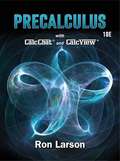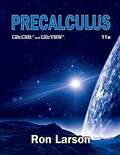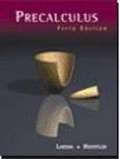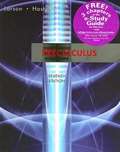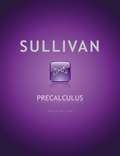- Table View
- List View
Prealgebra And Introductory Algebra
by Hawkes Learning SystemsThe purpose of Prealgebra and Introductory Algebra is to provide students with a review of basic arithmetic, an introduction to algebra, and a learning tool that will help them: 1. review basic arithmetic skills, 2. develop reasoning and problem-solving skills, 3. become familiar with algebraic notation, 4. understand the connections between arithmetic and algebra, 5. develop basic algebra skills, 6. provide a smooth transition from arithmetic through prealgebra to algebra, and 7. achieve satisfaction in learning so that they will be encouraged to continue their education in mathematics.
Prealgebra Textbook (Second Edition)
by Department of Mathematics College of the RedwoodsThis second edition of Prealgebra Textbook contains lessons on: The Whole Numbers, The Integers, The Fundamentals of Algebra, Fractions, Decimals, Ratio and Proportion, Percent, and Graphing.
Prealgebra and Introductory Algebra
by Julie Miller Molly O'Neill Nancy HydeCreate more lightbulb moments with this comprehensive set of valuable content and insightful, intuitive digital learning resources! This new 2nd edition of the Miller/O'Neill/Hyde Prealgebra and Introductory Algebra text seeks to serve the changing dynamics of today's curriculum by thoughtfully interweaving the topics of two foundational building blocks in students' mathematical journey. The text reflects the compassion of its experienced author team with features developed to address the specific needs of today's prealgebra and introductory algebra students. Included alongside the highly-favorable Problem Recognition Exercises, readers will find added review material, aimed at assisting students with synthesis, summarization, and recognition of key mathematical topics so as to enhance their overall conceptual understanding. These types of exercises, along with the overall number of practice problems and group activities available, permit instructors to choose from a wealth of problems, allowing ample opportunity for students to practice what they learn in lecture to hone their skills.
Prealgebra, 3rd Edition
by Julie Miller Molly O'Neill Nancy HydeAuthors and educators Julie Miller, Molly O'Neill, and Nancy Hyde are pleased to announce the highly anticipated 3rd edition of their Prealgebra series. Create more lightbulb moments with this comprehensive set of valuable content and pedagogy, and insightful and intuitive digital learning tools. The text reflects the compassion of its experienced author team with features developed to address the specific needs of today's prealgebra students. Included alongside the highly-favorable Problem Recognition Exercises, readers will find added review material, aimed at assisting students with synthesis, summarization, and recognition of key mathematical topics so as to enhance their overall conceptual understanding. These types of exercises, along with the overall number of practice problems and group activities available, permit instructors to choose from a wealth of problems, allowing ample opportunity for students to practice what they learn in lecture to hone their skills.
Prealgebra: Art of Problem Solving (AoPS)
by David Patrick Richard Rusczyk Ravi BoppanaPrealgebra prepares students for the rigors of algebra, and also teaches students problem-solving techniques to prepare them for prestigious middle school math contests such as MATHCOUNTS, MOEMS, and the AMC 8. Topics covered in the book include the properties of arithmetic, exponents, primes and divisors, fractions, equations and inequalities, decimals, ratios and proportions, unit conversions and rates, percents, square roots, basic geometry (angles, perimeter, area, triangles, and quadrilaterals), statistics, counting and probability, and more! The text is structured to inspire the reader to explore and develop new ideas. Each section starts with problems, giving the student a chance to solve them without help before proceeding. The text then includes solutions to these problems, through which algebraic techniques are taught. Important facts and powerful problem solving approaches are highlighted throughout the text. In addition to the instructional material, the book contains well over 1000 problems. The solutions manual (sold separately) contains full solutions to all of the problems, not just answers. This book can serve as a complete Prealgebra course. This text is supplemented by free videos and a free learning system at the publisher's website.
Precalculus
by Bernard Kolman Arnold Shapiro Michael L LevitanPrecalculus: A mathematics/statistics textbook
Precalculus
by Day Carter CuevasGlencoe Precalculus ©2011is a comprehensive program that prepares students to be successful in college or AP Calculus programs. Features of this program include: Chapter 0, Graphing Technology Labs, leveled exercise sets, H. O. T. (Higher-Order Thinking) Problems, and Preparation for AP Calculus lessons within every chapter. Glencoe Precalculusalso includes a complete technology suite that contains an online student edition, online teacher edition, Interactive Classroom, Advance Tracker, andExamView® Assessment Suite.
Precalculus
by Cynthia Y. YoungPrecalculus was developed to create a program that seamlessly align with how teachers teach and fully supports student learning. Cynthia Young’s goal was to create an intuitive, supportive product for students without sacrificing the rigor needed for true conceptual understanding and preparation for Calculus. Precalculus helps bridge the gap between in-class work and homework by mirroring the instructor voice outside the classroom through pedagogical features.
Precalculus
by Ron Larson David C. FalvoLarson's market-leading text, PRECALCULUS is known for delivering sound, consistently structured explanations and exercises of mathematical concepts to expertly prepare students for the study of calculus. With the ninth edition, the author continues to revolutionize the way students learn material by incorporating more real-world applications, ongoing review, and innovative technology. How Do You See It? exercises give students practice applying the concepts, and new Summarize features, Checkpoint problems, and a Companion Website reinforce understanding of the skill sets to help students better prepare for tests.
Precalculus
by David Sklar David Cohen Theodore B. LeeGet a good grade in your precalculus course with PRECALCULUS, Seventh Edition. Written in a clear, student-friendly style, the book also provides a graphical perspective so you can develop a visual understanding of college algebra and trigonometry. With great examples, exercises, applications, and real-life data--and a range of online study resources--this book provides you with the tools you need to be successful in your course.
Precalculus
by Glencoe McGraw-Hill StaffGlencoe Precalculus ©2011is a comprehensive program that prepares students to be successful in college or AP Calculus programs. Features of this program include: Chapter 0, Graphing Technology Labs, leveled exercise sets, H. O. T. (Higher-Order Thinking) Problems, and Preparation for AP Calculus lessons within every chapter. Glencoe Precalculus also includes a complete technology suite that contains an online student edition, online teacher edition, Interactive Classroom, Advance Tracker, and ExamView® Assessment Suite.
Precalculus
by Margaret L. Lial John Hornsby David I. Schneider Callie J. DanielsOver the years, the text has been shaped and adapted to meet the changing needs of both students and educators. As always, special care was taken to respond to the specific suggestions of users and reviewers through enhanced discussions, new and updated examples and exercises and helpful features. The result is an easy-to-use, comprehensive text that is the best edition yet.
Precalculus
by Michael SullivanA proven motivator for readers of diverse mathematical backgrounds, this book explores mathematics within the context of real life using understandable, realistic applications consistent with the abilities of any reader. Graphing techniques are emphasized, including a thorough discussion of polynomial, rational, exponential, and logarithmic functions and conics. Includes Case Studies; New design that utilizes multiple colors to enhance accessibility; Multiple source applications; Numerous graduated examples and exercises; Discussion, writing, and research problems; Important formulas, theorems, definitions, and objectives; and more. For anyone interested in precalculus.
Precalculus
by OpenStaxPrecalculus is intended for college-level Precalculus students. Since Precalculus courses vary from one institution to the next, we have attempted to meet the needs of as broad an audience as possible, including all of the content that might be covered in any particular course. The result is a comprehensive book that covers more ground than an instructor could likely cover in a typical one- or two-semester course; but instructors should find, almost without fail, that the topics they wish to include in their syllabus are covered in the text. Many chapters of Openstax Precalculus are suitable for other freshman and sophomore math courses such as College Algebra and Trigonometry; however, instructors of those courses might need to supplement or adjust the material. Openstax will also be releasing a College Algebra and Trigonometry title tailored to the particular scope, sequence, and pedagogy of those courses.
Precalculus
by Ron Larson Robert P. HostetlerA firm foundation in algebra is necessary for success in college-level mathe¬matics courses. Precalculus, Fourth Edition, is designed to help students devel¬op their proficiency in algebra, and so strengthen their understanding of the underlying concepts. Although the basic concepts of algebra are reviewed in the text, it is assumed that most students taking this course have completed two years of high school algebra. The text takes every opportunity to show how algebra is a modern model¬ing language for real-life problems. Examples, exercises, and group activities --many using real data--provide a real-life context to help students grasp math¬ematical concepts. As appropriate, graphing technology is utilized throughout the text to enhance student understanding of mathematical concepts.
Precalculus
by Ron LarsonThe tenth edition of PRECALCULUS gives you clear explanations of math concepts, examples and exercises that relate to everyday life, and innovative technology to help you study and practice when and where you want. "How Do You See It?" exercises let you practice applying the concepts, and new "Summarize" features and "Checkpoint" problems reinforce your understanding of the skills you need to better prepare for tests.
Precalculus
by Ron LarsonLarson's PRECALCULUS is known for delivering sound, consistently structured explanations and carefully written exercises of mathematical concepts. <p><p>Updated and refined through learning design principles, the 11th Edition removes barriers to learning and offers a carefully planned and inclusive experience for all students. New Review and Refresh exercises prepare students for each section and provide a general skill review throughout the text. How Do You See It? exercises give students practice applying the concepts, and new Summarize features, and Checkpoint problems reinforce understanding of the skill sets to help students better prepare for tests. Larson’s learning support includes free text-specific tutorial support at CalcView.com and CalcChat.com.
Precalculus (5th edition)
by Ron Larson Robert P. HostetlerThis comprehensive book provides complete coverage of the function concept and integrates substantial graphing calculator materials that help students develop insight into mathematical ideas.
Precalculus (7th Edition)
by Ron Larson Robert Hostetler David C. FalvoThe authors use precise mathematical language and a clear writing style to develop an effective learning tool for students. Solutions to examples are derived side by side - algebraically, graphically, and numerically.
Precalculus (9th Edition)
by Michael SullivanMike Sullivan's time-tested approach focuses students on the fundamental skills they need for the course: preparing for class, practicing with homework, and reviewing the concepts. In the Ninth Edition, Precalculus has evolved to meet today's course needs, building on these hallmarks by integrating projects and other interactive learning tools for use in the classroom or online.

